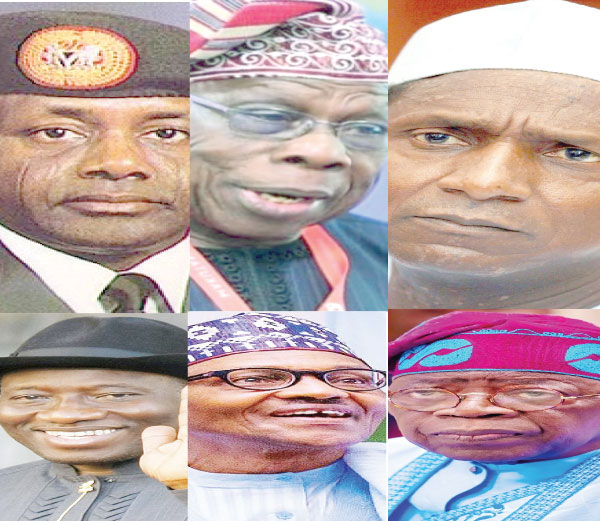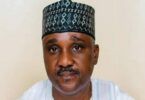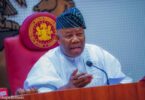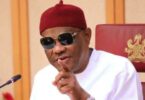Following the heightened public outrage over recent scandalous activities of the corruption-spewing national social investment programme, IMOLEAYO OYEDEYI, examines the country’s age-long anti-graft war, and why a string of bold reforms by successive administrations have failed to yield expected results, as the scale of political corruption worsens year in, year out.
IN 2016, a year after he assumed office, former President Muhammadu Buhari set up the National Social Investment Programme Agency (NSIPA) to tackle the prevailing poverty and hunger across the country.
To ensure effective deliverables, the agency emplaced four cogent programmes, which include the N-Power Programme targeted towards developing young Nigerians with life-long skills alongside monthly stipends of N30,000. The NSIPA initiatives also include the Conditional Cash Transfer (CCT) programmes driven toward those within the lowest poverty bracket in the country. It also has the Government Enterprise and Empowerment Programme (GEEP), which is a micro-lending intervention, and the Home Grown School Feeding Programme (HGSF) aimed at delivering school feeding to children with a specific focus on increasing school enrolment and reducing the incidence of malnutrition.
To consolidate these programmes years later, the Buhari government also established the Ministry of Humanitarian Affairs, Disaster Management, and Social Development. The ministry currently known as the Ministry of Humanitarian Affairs and Poverty Alleviation was created through an Executive Pronouncement on August 21, 2019.
NSIPA was thereafter placed as an agency under the ministry. But less than five years after, Buhari’s successor, Bola Tinubu, in January, suspended the entire programmes being overseen by the agency over perceived systemic corruption, crass management of public funds, and gross violation of due process.
NSIPA’s operational lapses
Before this, there had been growing concerns in the polity regarding NSIPA’s operational lapses and improprieties surrounding payment to the designed beneficiaries of its programmes. Some people have argued that the agency and its supervising ministry, instead of effectively being channels through which the pervasive penury in the country will be alleviated, have contrastingly become strongholds where high-handed looting of public funds thrives. Consequently, the National Coordinator of the agency, Halima Shehu, was suspended late last year.
The current head of the poverty alleviation ministry, Mrs Betta Edu, also suffered a similar suspension earlier this month when a leaked memo indicted her as having allegedly attempted to transfer the sum of N585 million meant for some social intervention programmes into a private account.
The saga later took an embarrassing tone days later as Edu and her predecessor, Sadiya Umar-Farouq, as well as Shehu all landed in the EFCC net, where they have since been fielding questions over various corrupt allegations. Unlike Edu, Farouq and Shehu are being grilled over their involvement in the N37 billion corruption scandal that rocked the ministry during the Buhari administration.
The sleazy indictment of the three female political officers, according to observers, has again echoed the age-long endemic corruption afflicting public governance in the country, and its fruitless anti-graft war of decades.
According to Abiodun Olakunle, a senior official in the Centre for Democracy and Development (CDD), political corruption in Nigeria is not a new phenomenon, as it dates back to pre-colonial times.
He said, “The rapid economic development witnessed shortly after Nigeria’s independence in 1960 was attended by inherent periods of social disruptions, upheavals, and political instability underpinned by ethnic and regional politics, and that “The emerging middle class of the period, developed an ostentatious and conspicuous consumption lifestyle which were strong incentives for clientelism and political corruption.”
Olakunle noted that as early as the late 1950s and 1960s, the Foster-Sutton and Justice Coker Commissions had been constituted to address the malfeasance. But while reports of both Commissions revealed impropriety perpetrated by top-level politicians to divert millions of pounds to serve private ends in the African Continental Bank (ACB) in Eastern Nigeria and the defunct marketing boards in Western Region, the situation became accentuated at independence, setting the stage for the first military incursion into Nigerian politics in 1966 and the advent of successive military rules.
Olakunle, who is the CDD Programme Director, stressed that since independence, every military regime has attempted to address corruption, using different initiatives and strategies. Yet, the menace continued to defy all efforts and instead kept draining the country’s resources with dire multidimensional consequences.
He said during the military era, tribunals and Commissions of Inquiry, Ad-hoc committees and special units were, at different times, also instituted to tackle corruption, but all to no avail.
It will be recalled that the first major frontal attempt at fighting corruption structurally in the country was the promulgation of the Corrupt Practices Decree of 1975 by the Murtala Muhammed regime. But the modest successes of that administration were short-lived as that regime lasted barely a year before it was overthrown.
Olakunle said, “The second Republic (1979 – 1983) and the successive military regimes (1984-1999), however, witnessed intensified prebandalist tendencies, patronage, and unprecedented corruption, with the Abacha regime recorded internationally as the most primitive in capital accumulation with over USD$2.5 billion stolen from public coffers.”
Sleaze worsened even with democracy
As democracy returned in 1999, many had hoped to see a sharp departure from the norm, but the fiber of corruption unfortunately sunk deeper, despite the administration of former President Olusegun Obasanjo ratifying the United Nations Convention against Corruption (UNCAC) in 2004. The OBJ’s government further went on to establish the Independent Corrupt Practices Commission (ICPC) and the Economic and Financial Crimes Commission (EFCC), in 2000 and 2003 respectively.
According to reports, given the fact that about US$400 billion had been stolen in the country between 1960 and 1999, OBJ created and empowered the two anti-corruption agencies to prevent, investigate and prosecute economic and financial crimes as entailed in the Banks and Financial Institutions Act 1991, Miscellaneous Offences Act, the Money Laundering Act 1995, the Failed Banks (Recovery of Debts) and Financial Malpractices in Banks Act 1994, the Advance Fee Fraud and Other Fraud Related Offences Act 1995, the Economic and Financial Crimes Commission Act (2004), and the Money Laundering and (Prohibition) Act 2004.
The OBJ government also backed the agencies with comprehensive economic reforms of the public sector (including the judiciary) under the National Economic Empowerment and Development Strategy (NEEDS).
Catalogue of corruption cases
Despite this string of bold reforms, three former ministers who served in the OBJ’s government: Sunday Afolabi, Mahmud Shata, and Husseini Akwanga ended up with various scandalous allegations of heavy corruption. They were slammed with 16 counts each of bribery and corrupt enrichment. Among other politicians indicted during the OBJ’s reign were Okwesilieze Nwodo, former national secretary of the ruling Peoples Democratic Party (PDP), and Turrie Akerele, a former Permanent Secretary in the Ministry of Internal Affairs. Even though they all pleaded not guilty to the horrific corruption charges leveled against them, OBJ still went ahead to sack Akwanga, the then Minister of Labour.
Even when the former military head of state was reelected for his second term, his Minister of Education, Chief Fabian Osuji, was indicted by the EFCC for giving N55 million (then $400,000) in bribes to the then Senate President, Adolphus Wabara, and some members of the National Assembly to pass an over-bloated budget of education ministry. Obasanjo again wielded the big stick by sacking Osuji almost immediately through a national broadcast. While Wabara was forced to resign, the Obasanjo’s government went ahead to charge the indicted people to court.
The media also documented the disreputable act of former Inspector General of Police, Tafa Balogun, who was accused of diverting over 2.7 billion naira (US $20 million). Obasanjo also ordered his arrest and resignation from office. Balogun subsequently faced trial. But all these still didn’t discourage corruption in the country as bigger cases came afterwards.
In the succeeding administration of late President Umaru Musa Yar’adua, Professor Adenike Grange and Mr Gabriel Aduku were appointed Minister of Health and Minister of State for Health in 2007. But less than a year after, they were unceremoniously fired for their inability to return N300 million unspent money in the ministry meant for the 2007 budget. As a demonstration of his zero tolerance for corrupt practices, Yar’adua even went further to order the suspension and probe of key staff of the health ministry that were involved in the mess.
Despite committing to rigorous United Nations’ instruments of anti-corruption, terrorism, and criminal justice reforms, the administration of Goodluck Jonathan, which came after Yaradua, also witnessed high corruption incidence as no fewer than 25 persons who served as ministers, aides and advisers during the reign have been on close investigation by the EFCC over various corruption allegations.
One of the high-profile corruption cases of the Jonathan’s government was that of a former Minister of Petroleum Resources, Diezani Alison-Madueke, accused of diverting $115m (N23bn) oil cash. There was also that of former National Security Adviser, Colonel Sambo Dasuki (retd.) alleged to have misappropriated $2.1 billion public funds meant for arms procurement.
According to reports, others Jonathan’s ministers under probe include a former Minister of Federal Capital Territory (FCT), Senator Bala Mohammed; a former Minister of Interior, Abba Moro; a former Minister of Aviation, Senator Stella Oduah; another former Minister of Aviation, Chief Femi Fani-Kayode; a former Minister of State for Foreign Affairs, Professor Viola Onwuliri; a former Minister of Justice and Attorney-General of the Federation, Mohammed Adoke (SAN); a former Minister of Labour and productivity, Senator Joel Danlami; a former Minister of State for Niger Delta Affairs, Godsday Orubebe; and a former Minister of Education, Ibrahim Shekarau.
According to the United Kingdom’s Department for International Development, about $32 billion was lost to corruption during the six-year administration of ex-President Jonathan, while the country got its worst Transparency International Corruption Perception rating under Muhammadu Buhari that succeeded Jonathan. In the TI’s index published before the former military Head of States bowed out of office, the country dropped five places, having scored 24 out of 100 points, ranking 154 out of 180 countries.
According to Olakunle, from the Obasanjo’s era down to the last administration of Buhari, the vast corruption cases recorded were indicative of the apparent futility of the country’s anti-graft war. He said despite efforts by successive civilian administrations to change the status-quo, the sheer decadence of moral values, the unbridled monetization of Nigerian politics, and the quest for personal aggrandizement continue to fuel the sustenance of corruption and foil any earnest efforts to curb its spread in the country. But amid all, some observers have been quick to point accusing fingers at the two major agencies saddled with the anti-graft mandates.
According to Zainab Suleiman Okino, a syndicated columnist with Premium Times, since creation, the EFCC and ICPC have always been mired in controversy and blemished by political influence. She said from the appointment of the heads to their activities, the anti-graft agencies have also been troubled, as much as they trouble alleged offenders, in addition to the subtle institutional rivalry between them and the Attorney General of the Federation (AGF) office.
Tracing the downward trajectory of the Nigerian anti-graft agencies, she said for many years the EFCC has been subjected to political manipulation, and that instead of operating chiefly as an unbiased anti-graft bureau that will go after every indicted public office holder, the agency has been a tool used by sitting president to witch-hunt opponents over spurious allegations, even though politicians whose ambitions were abridged by EFCC for daring to challenge the president in the past later got reprieve in court after long and tortuous litigations.
According to her, one notably worrisome aspect of the country’s years of fruitless anti-graft war is the fact that ‘almost all former EFCC chairmen have had their reputations soiled as they were either accused of corruption—the core mandate of their job—or stopped from doing that same work?
While arguing that the constant political interference in the activities of the country’s foremost agency set up to curb economic sabotage and illegal acquisition of wealth by those in charge has kept compounding the malady asphyxiating the anti-graft war, the columnist said, “The pioneer EFCC chairman, Mallam Nuhu Ribadu, appointed by President Tinubu as the National Security Adviser, was removed unceremoniously by President Umaru Yar’adua over his witch-hunting of friends of that government at that time.
“However after putting a corruption dent on many politicians including governors, con artists, internet fraudsters, ministers, and people with ill-gotten wealth, the EFCC strongman later delved into partisan politics, which was a red flag, and indeed a setback for the anti-corruption war considering that politics is full of compromises, and inherently corrupt. For an anti-corruption czar and fighter to hobnob with those he hounded was (still is) an expensive joke,” Zainab posited.
She said, “The tenure of Farida Waziri who took over from Ribadu was largely uneventful and stellar, but she too ran into troubled waters over allegation of being sponsored by corrupt politicians before she was also booted out by Goodluck Jonathan in what he called ‘national interest’ and replaced by Ibrahim Lamorde, whose tenure was characterised by alleged missing $5 billion.”
However, she said the coming to power of the All Progressives Congress (APC) changed a lot about the EFCC dynamics. President Buhari nominated Ibrahim Magu as acting EFCC chairman but never dared to get him cleared by the Senate as substantive chairman perhaps because of his (Magu) battle with AGF Abubakar Malami. Two times he was denied clearance after screening over a ‘security report’.
The columnist said even the youthful Abdulrasheed Bawa who came in after Magu with so much promise also fell in a smelly ditch as ‘he was later hounded into DSS detention facility shortly after Tinubu was sworn in over allegations of corruption and abuse of office, and no one has sighted him since then. According to her, Bawa’s travails appeared connected to his effrontery to take on and investigate powerful politicians who are now serving in Tinubu’s government.’
Anti-graft agencies as toothless bulldogs
Given the controversies and misery that becloud the anti-corruption war, the federal government was, in April 2012, asked to scrap the anti-graft bureaus and other 375 agencies of the government on the grounds of perceived inefficiency and replication of duties at a huge cost on the nation’s purse.
The Presidential Committee on the Rationalisation and Restructuring of Federal Government Parastatals, Commissions, and Agencies made this call in its 800-paged report which recommended the reduction of the nation’s total 541 ministries, departments, and agencies (MDAs) to 163. During the submission of the report, the committee led by the former Head of Service, Steve Oronsaye recommended the outright scrapping of the anti-graft agencies (EFCC and ICPC) which it claims are performing the traditional functions of the Nigeria Police Force.
In a similar vein, a public commentator, Olu Fasan, in a recent report, argued that the high rating of the country on the global corruption index attests to the gross ineffectiveness of the anti-graft agencies in the country’s never-ending war against corruption.
He said, “If in 2023, Nigeria still ranks as a highly corrupt country, what exactly has EFCC been doing over the past 20 years? Why has it not moved the dial on corruption?”
According to him, successive leaders of the EFCC since its inception have not been above board or beyond reproach, and the institution itself has failed abysmally to reduce, let alone stop corruption in the country due to the Nigerian factor.
“The logic goes thus: if corruption is so endemic and widespread in Nigeria, then it’s futile to expect any institution manned by Nigerians to tackle it. Are those running the EFCC, not Nigerians? Are they not part of Nigeria’s deeply corrupt ecosystem? So, why expect them to have different values, norms, and motivations from the wider society? The same logic applies to the Independent National Electoral Commission, (INEC), the judiciary, and other state agencies,” he argued.
“We often hear allegations of corruption and money laundering running into hundreds of billions of naira against governors, ministers, and other public officers. But they almost always fizzle out. Just as politicians rig elections and tell their opponents to go to court, they loot the public purse and dare the EFCC to do its worst. Sadly, the EFCC is a toothless bulldog! Yet, if Nigeria must succeed, it must root out corruption and not normalise it!
“To that end, Nigeria must introduce an Unexplained Wealth Order, UWO, and reverse the burden of proof in corruption cases. UWO means that if a public officer can’t explain the source of his excessive wealth, he will forfeit it. Reversing the burden of proof means the onus is on anyone accused of massive corruption to prove innocence. With those tools, all Nigeria needs is an independent Office of Public Prosecutor, not the moribund, ineffectual EFCC,” he further argued.
However, the Chairman of the Senate Committee on Drugs, Narcotics, and Anti-Corruption, Senator Victor Lar, and two past chairmen of ICPC, Justices Mustapha Akanbi and Emmanuel Ayoola, all vigorously opposed this position, arguing that scrapping the anti-graft bodies would weaken the fight against corruption and that the incompetence of the police to tackle cases informed the establishment of the anti-graft bodies.
While Akanbi explained that the mirage of security challenges facing the country makes the creation of these agencies imperative, Ayoola, in his reaction, said that scrapping the agencies is not the right solution. Instead, he called for the strengthening of the institutions for better performance, especially in the wake of new incidences of corruption in the country.
Crude prosecution
While lending his voice on how the Federal Government can revive the floundering anti-graft war, the AGF and Minister of Justice, Prince Lateef Fagbemi (SAN), had during his ministerial screening at the National Assembly last year called for a merger of the two anti-graft agencies, while a supervisory authority is emplaced to oversee the new agency’s operations.
The AGF had argued that the extant situation whereby one of the two agencies will carry out an investigation and also later act as the prosecutor of allegedly corrupt public officeholders is creating systemic problems, and worsening the futility upsetting the anti-corruption war.
“It doesn’t augur well to ask the same authority to do an investigation and carry out prosecution. That is why we have problems. If I have my way, first of all, bring ICPC and EFCC together, and unbundle them. An investigation should not be handled by the same body.
“The tradition of arresting a suspect before an investigation was not ideal. In corruption matters, you can take your time to prosecute but when you knock, it should be like the way an average American will react when the FBI knocks at your door; you will be surprised at what they have on you. My advice would be that, in matters of law, the AGF should be involved. DSS cannot be an island unto itself; EFCC cannot continue to behave as if there is no law. There is a law.
“And if you want to do an investigation, do it before inviting the accused person. It is not a question of inviting a man and saying: ‘We have caught a big fish’, then at the end of the day, you say you are investigating. That also goes to the issue of the pace at which the cause of justice travels. It can be slow, but it’s very sure. You do your investigation before arrest and not arrest before investigation,” the AGF contended.

N2.9tn lost to procurement fraud
But the current EFCC chairman, Ola Olukoyede, and the Executive Director of the Civil Society Legislative Advocacy Centre (CISLAC), Auwal Rafsanjani, had at different forums posited that flushing corruption out of the fabrics of Nigerian society requires a spectrum of holistic efforts that will begin at the National Assembly and geared towards more of prevention than enforcement.
Olukoyede said, “The fight against corruption must begin from the hallowed chamber. If you are fighting corruption, you become the enemy of everybody.”
According to him, “Enforcement is a very strong tool in our hands and we are going to apply it very seriously. Without downplaying the importance of enforcement, there is what we call a transactional credit system. If we continue to allow Nigerians to buy houses, cars, and other luxurious properties by cash because we don’t have an effective credit system, one thousand anti-corruption agencies will not do us any good and that is the reality.”
He said, “We must create an atmosphere to make sure that people have choices. If I don’t steal money, can I afford to train my children in school with good standards? If I don’t steal money, can I buy a car after I have worked for five years? If I don’t steal money, can I put a three-room bungalow in place after I have worked for 20 years? An average Nigerian does not own a home, when he has the opportunity, he would steal. Even if he does not have the opportunity, he would create one.”
Substantive justice on technicalities
The new EFCC chairman also called on the judiciary to place substantive justice above technicalities when dealing with corruption cases.
“We must encourage our criminal justice system to adjudicate in such a way that it will not drag for a very long time. Prosecution should not be allowed to last for a maximum of five years from the court of first instance to the Supreme Court. The Senate can work on that very seriously. If we make the administration of the criminal justice system work, you will see the great work the anti-corruption agencies are doing,” Olukoyede added.
While noting that there was a connection between the low standard of living in the country and the rise of corruption, he said, “The savings of an average civil servant in Nigeria all through his service years cannot build the type of houses they are building and cars they are riding.
“The problem we have is just like the proverbial monkey that was locked up in a cage with a bunch of ripe bananas. The owner stood outside with a cane. The monkey would either eat the bananas, get beaten and be alive, or allow the bananas to get rotten and die of hunger,” he stated.
The EFCC boss, who revealed that the country lost a total of N2.9tn to procurement fraud in three years, said, “I will do more in the areas of blocking the leakages. We spend more money fighting corruption when we could have spent less to prevent it.”
Explaining some of the discoveries he uncovered when he surveyed between 2018 and 2020 on 50 (both human and corporate) entities in Nigeria, Olukoyede said, “I picked just one scheme, one species of fraud, which is called contract and procurement fraud. I discovered that within three years, Nigeria lost N2.9 trillion. When I put my figures together, I discovered that if the country had prevented the money from being stolen, it would have given us 1,000 kilometres of road, built close to 200 standard tertiary institutions, and educated about 6,000 children from primary to tertiary levels at N16 million per child.
“It would have also delivered more than 20,000 units of three-bedroom houses across the country. It would have given us a world-class teaching hospital in each of the 36 states of the country and the federal capital territory,” Olukoyede stated.
In consonance with the EFCC chairman, Rafsanjani said, “Strengthening measures to prevent corruption, past administrations of the commission have secured a commendable number of convictions, and more recently, a total of 3,785 convictions were recorded across all its Commands in 2022, recovering over $121 million (about N51 billion at the average exchange rate of N423/$ for 2022) and non-cash assets.
“As a cost-effective and proactive way of conducting its operations, the EFCC should explore opportunities for strengthening preventive mechanisms, including but not limited to strategic collaborations and integration with relevant agencies for real-time data and information-sharing.
“Formulating strategies to prevent corruption will also entail enhancing the EFCC’s capabilities, which includes fostering integrity within the organisation and establishing frameworks that guarantee transparency and foster accountability in public administration.”
Prosecution stymied by interlocutory appeals
Similarly, Honourable Kayode Oladele, a former Chairman, House of Representatives Committee on Financial Crimes, also feels the judiciary and the legal system is one crucial factor in the fight against corruption.
He said, “It is not just the EFCC that is in charge, the buck stops at the judiciary’s table. This is because the EFCC is only concerned with investigation. The conviction is in the hands of the court.”
According to him, “Even if the EFCC does a thorough investigation and does its work very well in prosecution, if the court still feels that the case has not been proved beyond reasonable doubt, the court can acquit the person. Therefore, for there to be an effective fight against corruption, the judiciary and the activities of the EFCC have to be looked into.”
“In Nigeria today, I can tell you sadly that we have problems with the judiciary, and it has to be cleansed because of some judges. Some of them work in tandem with some senior lawyers to frustrate some of the corruption cases. Sometime they adjourn the cases so many times.
“A case may take as much as eight to 10 years to complete. If a case takes this long, you know very well that in the process a lot may have happened. There will be a loss of confidence in the judiciary. The victims or witnesses may have been relocated to other places; some may even die. Some of the investigators may have been redeployed,” he explained.
“Another way of frustrating the cases is through interlocutory appeals. As a result of this, you will find that sometimes the main case can be left untouched for about five years when the appeals are being pursued,” he added.
But will President Tinubu further display more political steel to sanitise the country’s judiciary and efficiently impact the Anti-graft war? Only time can tell.
YOU SHOULD NOT MISS THESE HEADLINES FROM TheWitness
FULL LIST: 45 visa-free countries Nigerian passport can travel in 2024
Nigeria sits behind Ghana, Guinea, Kenya, Lesotho, Morocco, Benin Republic and Namibia which are at…
How my brother and I became professor same day in same varsity —UNILORIN don
Recently, two brothers –Ahmed Oloduowo Ameen and Mubarak Oloduowo Ameen– were promoted to…
‘I expected N2,000 as my share from sale of human head we got at Saki cemetery’
Thirty-two-year-old Alli and Abdullahi, aged 35, who were the two suspects arrested by…
Why Port Harcourt refinery is yet to start production—Soneye, NNPCL Chief Comm Officer
Mr Femi Soneye is the Chief Corporate Communications Officer (CCCO) of the…
Fear women, fair women and Minister Ojo
Betta Edu, Sadiya Umar-Farouq and Halima Shehu are the reigning women in our…
What you should know about players in Nigerian 2024 AFCON team
The Nigerian football team have appeared in the finals of the Africa Cup of Nations on twenty different occasions. Nigeria has…







